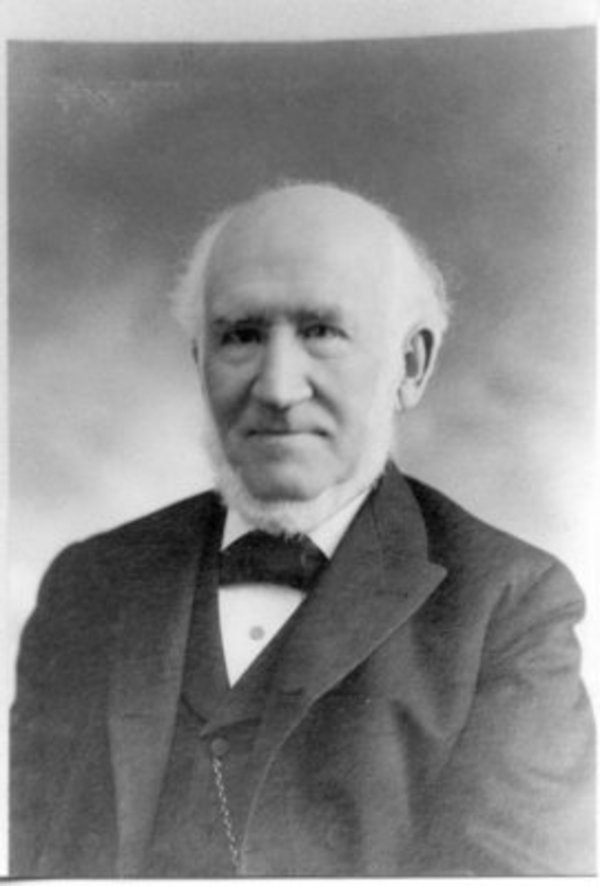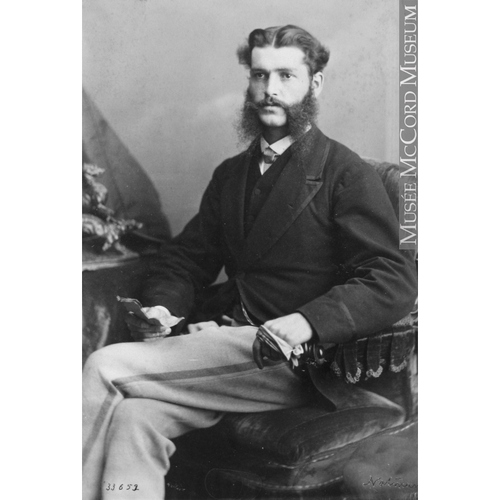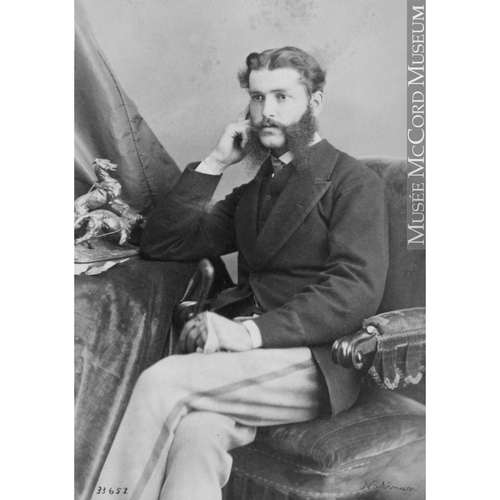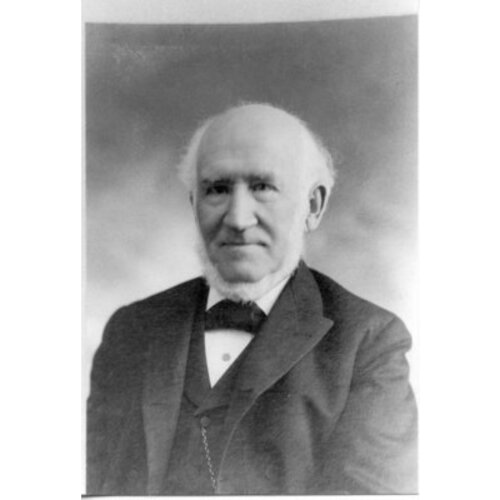
Source: Link
BOWMAN, WILLIAM, mechanical engineer, businessman, and politician; b. 20 March 1820 in Liverpool, England, son of William Bowman, an ironmonger and Methodist lay preacher, and Sarah Piel; m. 1844 Emma Maria Smith, and they had five sons and two daughters; d. 6 Aug. 1909 in Port Stanley, Ont.
One of nine children, William Bowman received his education in mechanical engineering in Liverpool and London. Upon graduation he obtained employment in the engineering department of the London and Northwestern Railway. In 1853 he immigrated to Upper Canada to become mechanical superintendent, based in Hamilton, of the Great Western Railway, then under construction from Windsor to Niagara Falls [see Charles John Brydges*]. He brought the first locomotive into London in October 1853; the line was finished the following year. In 1855 he was appointed superintendent of the London and Port Stanley Railway, which was completed the next year. Settling in London, Bowman soon became the railway company’s secretary-treasurer. He retired as superintendent in 1875, when the line was leased to the Great Western, but continued as secretary-treasurer until 1893.
Alert to opportunities in business and engineering, in 1867 Bowman had organized, and become president of, the Canada Chemical Manufacturing Company, which set up the first plant in Canada for making sulphuric acid. The oil industry, then undergoing rapid development in Lambton County [see James Miller Williams*], required the acid to remove the objectionable odour of raw petroleum. Bowman’s son James Henry, a chemistry professor at Western University of London, Ontario, later supervised the manufacturing process. The company expanded to produce other acids and chemical products, but was forced by competition to close in 1904.
Among Bowman’s other business concerns, almost all based in London, was Bowman and Company, a dealership in coal, wood, and coke established in 1874 with another son, Charles Arthur. A founding member of the Board of Trade in 1881, Bowman was president of the City Gas Company and was a director of the London Life Insurance Company [see Joseph Jeffery*], the London Street Railway Company, and the Ontario Loan and Debenture Company. His obituary in the London Free Press noted that he had been a manager of the North West Transportation Company. Since this was a shipping line which operated out of Sarnia, it seems unlikely that he could have been an active manager, but no details of his involvement have been found.
William Bowman did not limit his activities to business. An alderman, he served for a time as chairman of finance for city council. His philanthropic endeavours included being a benefactor of the Protestant Orphans’ Home, a founder of the local Young Men’s Christian Association, a director and trustee of the London Humane Society, and a president of the London Mechanics’ Institute. He supported the temperance movement and was on the executive of the London and Western Ontario Prohibition Union. Following in his father’s footsteps as a staunch Methodist, he was a founder and trustee of Dundas Street Centre Church, a lay preacher, a supervisor of sabbath school for 40 years, and a delegate to ecumenical and general conferences. As well, he had a general interest in many religions, among them Hinduism with its system of caste.
Of the Bowmans’ seven children, five survived infancy – three sons and two daughters, Emma Sarah and Elizabeth Ellen. James and Charles worked with their father; John became a prominent wholesale dealer in London. Bowman was predeceased by both his wife and John. To the end, he retained a link with Port Stanley, which he had helped develop through the London and Port Stanley Railway. He died there at his summer home in 1909 and was buried in Mount Pleasant Cemetery, London.
AO, RG 22, ser.321, no.9882. Univ. of Western Ont. Library, Regional Coll. (London), Port Stanley, assessment rolls, 1894–1909; Edwin Seaborn coll. of diary transcripts, box 5582 (William Bowman diary). London Free Press, 6 Aug. 1909. Canadian album (Cochrane and Hopkins). J. T. H. Connor, “A note on sulphuric acid production in Victorian Ontario,” OH, 75 (1983): 290–98. T. T. McC. Ferris, “History of the London and Port Stanley Railway, 1852–1946” (ma thesis, Univ. of Western Ont., 1946). History of the county of Middlesex . . . (Toronto and London, 1889; repr., intro. D. [J.] Brock, Belleville, Ont., 1972). Industries of Canada: historical and commercial sketches: London, Guelph, Berlin, Brantford, Paris, Waterloo, Chatham and environs . . . (Toronto, 1886). London and its men of affairs (London, [1915]). W. A. E. McBryde, “Ontario: early pilot plant for the chemical refining of petroleum in North America,” OH, 79 (1987): 203–29. National encyclopedia of Canadian biog. (Middleton and Downs). The prohibition leaders of America, ed. [B.] F. Austin (St Thomas, Ont., [1895]). B. S. Scott, “The economic and industrial history of the city of London, Canada, from the building of the first railway, 1855, to the present, 1930” (ma thesis, Univ. of Western Ont., 1930).
Cite This Article
Christopher Andreae, “BOWMAN, WILLIAM,” in Dictionary of Canadian Biography, vol. 13, University of Toronto/Université Laval, 2003–, accessed December 31, 2025, https://www.biographi.ca/en/bio/bowman_william_13E.html.
The citation above shows the format for footnotes and endnotes according to the Chicago manual of style (16th edition). Information to be used in other citation formats:
| Permalink: | https://www.biographi.ca/en/bio/bowman_william_13E.html |
| Author of Article: | Christopher Andreae |
| Title of Article: | BOWMAN, WILLIAM |
| Publication Name: | Dictionary of Canadian Biography, vol. 13 |
| Publisher: | University of Toronto/Université Laval |
| Year of publication: | 1994 |
| Year of revision: | 1994 |
| Access Date: | December 31, 2025 |





